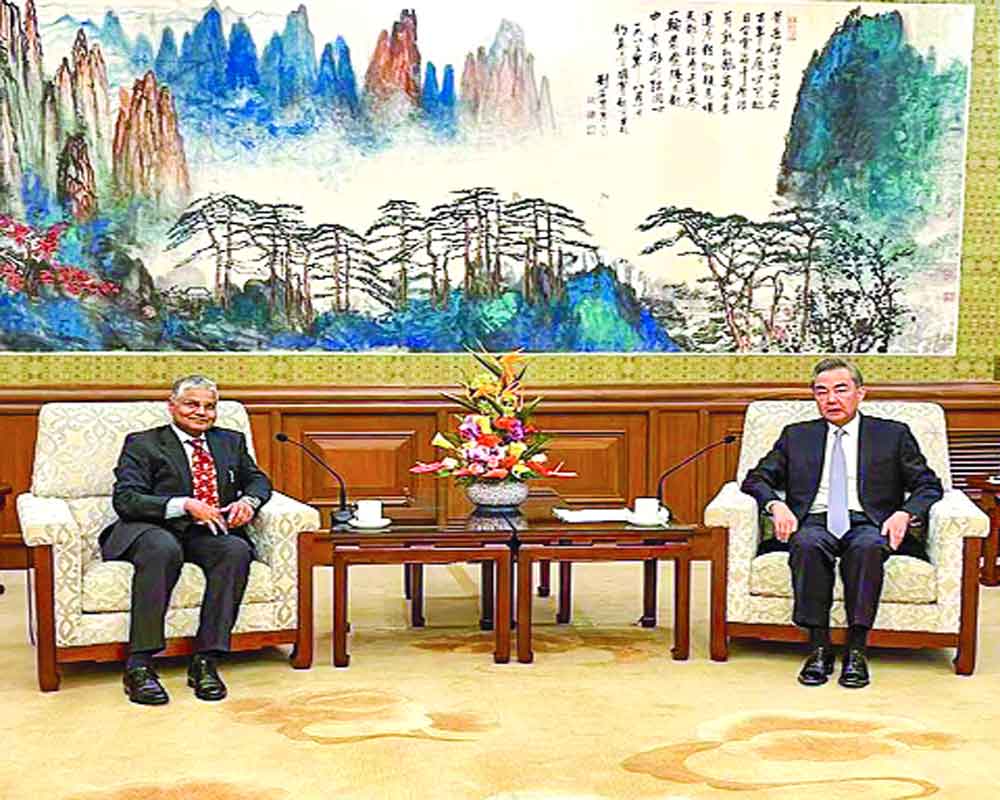Beijing says interests outweigh differences, proposes four-point process to boost ties
Even as face-offs persist at the border in Ladakh for the last two years, China has urged India to meet “halfway”, saying common interests outweigh differences between the two countries. China also called for enhancing mutual trust rather than remain “suspicious of each other.”
This message was conveyed by Chinese Foreign Minister Wang Yi to India’s ambassador Pradeep Kumar Rawat on Wednesday in Beijing. The Chinese minister also proposed a four-point process to improve ties between the two countries.
The Indian envoy emphasised the “criticality of maintenance of peace and tranquility in the border areas” to realise the full potential of the consensus between the top leaders of the two sides on the importance of Sino-India ties for Asia and the world.
“Bilateral and multilateral issues of interest to both sides were touched upon during the conversation” between Rawat and Wang, the Indian embassy in Beijing said in a statement on Thursday.
“Wang Yi conveyed that at the highest level of leadership of the two countries, there is consensus on the importance of bilateral relations for Asia and the world,” the release said.
“Wang Yi said the border issue is important and we should stay committed to peacefully addressing it through consultation and coordination,” it said.
The meeting between Wang Yi and Rawat came ahead of the virtual meeting of Prime Minister Narendra Modi with President Xi Jingping and other heads of states of the BRICS combine on Thursday.
Incidentally, Wang Yi was the first Chinese minister to visit India this March since the stand-offs erupted at the Line of Actual Control (LAC) in Eastern Ladakh in May 2020 leading to major flare up. He held talks with External Affairs Minister S Jaishankar to find ways for early disengagement of troops from the friction points.
In the first meeting between Wang Yi and Rawat, the Chinese foreign minister said the two countries should support rather than undermine each other and enhance trust rather than be suspicious.
Wang also said China and India’s common interests far outweigh their differences, adding that the two sides should support rather than undermine each other, strengthen cooperation rather than guard against each other, and enhance mutual trust rather than be suspicious of each other, according to a statement by the Chinese foreign ministry.
Wang Yi said the two sides should meet each other halfway to push bilateral relations back onto the track of stable and healthy development at an early date, jointly address various global challenges, and safeguard the common interests of China and India as well as the vast number of developing countries.
He called on both sides to adhere to the important strategic consensus reached by the leaders of the two countries, insist on placing the border issue in a proper position within bilateral ties, and seek solutions through dialogue and consultation.
China and India should also give full play to their traditional advantages in people-to-people and cultural exchanges, continuously expand mutually beneficial cooperation, and work together to create a better future for mankind, the state-run Xinhua news agency quoted Wang as saying.
The Chinese Foreign Minister proposed a four-point agenda to define and take forward ties with India which are frosty at present due to tension at the LAC.
The four principles Wang mentioned included the requirement to follow the “important strategic consensus” reached by the top leadership of the two countries that “China and India are not competitors, but partners; and China and India will not pose threats to each other and are mutual development opportunities”, the statement said.
“We should place the border issue at an appropriate position in bilateral relations and seek solutions through dialogue and consultation,” according to Wang is the second principle to be followed. The remaining two principles were the need to expand “mutually beneficial cooperation” and to “expand multilateral cooperation” and “jointly cope with the “complex world situation”.
He said India’s tradition of independent foreign policy was reflected in a recent speech by External Affairs Minister S Jaishankar, where he had expressed his disapproval of “Eurocentrism” and his hope that no external forces should interfere in China-India relations.
The Chinese Foreign Minister was referring to Jaishankar’s June 3 speech at the GLOBESEC 2022 Bratislava Forum where he said the world could no longer be “Eurocentric”, and that Europe needed to shun that mindset in the context of the Russian invasion of Ukraine.
The Chinese foreign minister also said Beijing attached importance to the Indian side’s concerns regarding the return of Indian students and that he hoped to see early progress on this,” the Indian embassy release said.
He also referred to the discussions on resumption of direct flight connectivity between the two sides, it said. “Rawat conveyed that the relevant agencies in India are seized of the matter and we may see progress in the matter soon,” it said.
Over 12,000 Indian students have reportedly expressed their wish to return and their details have been forwarded to the Chinese government for processing. About 23,000 Indian students are studying in Chinese universities, mostly in medical courses.


























